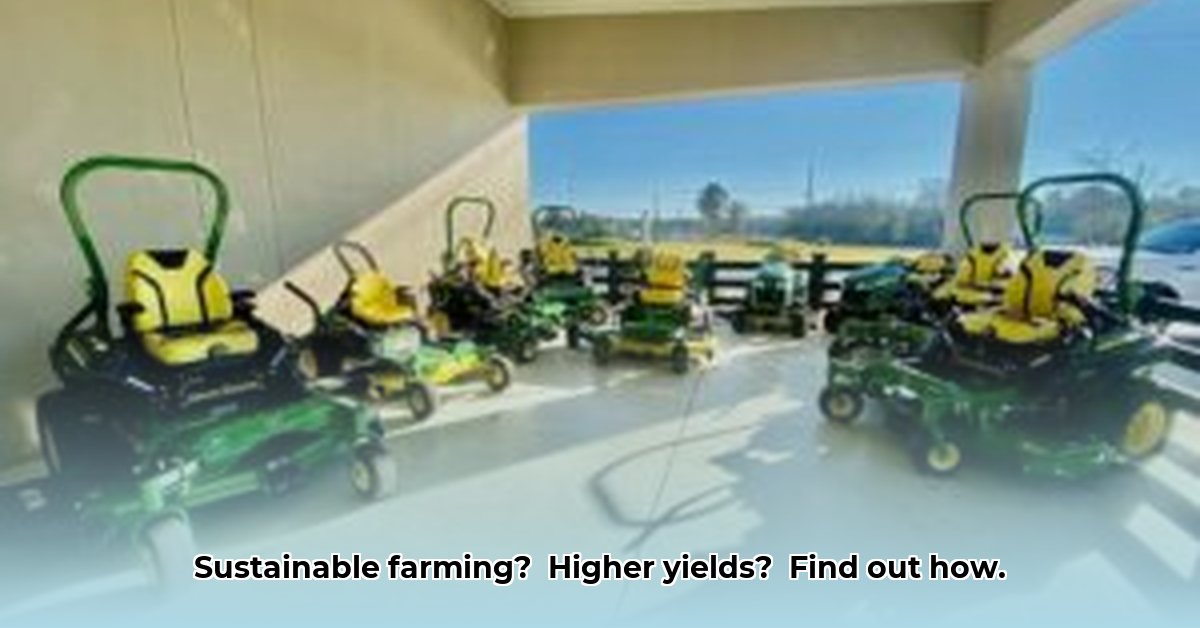
Sustainable farming practices are no longer optional; they're essential for the future of agriculture in Tifton, Georgia. This article explores how Lasseter Tractor, combined with modern agricultural advancements, can help you cultivate a more profitable and environmentally responsible farm. We'll delve into practical strategies for boosting yields while conserving precious resources like water and soil. Learn more about Lasseter Tractor's services by visiting their website.
Smart Farming: Precision Agriculture and Your Farm's Future
Precision agriculture offers farmers the ability to manage resources with pinpoint accuracy. Instead of blanket applications of fertilizers and pesticides, this approach focuses on applying these inputs only where needed. This targeted approach minimizes waste, reduces environmental impact, and maximizes efficiency. Lasseter Tractor can connect you with GPS-guided tractors, soil sensors, and data analysis software, providing a detailed picture of your field's health. This data-driven approach allows for informed decision-making, optimizing resource allocation and potentially increasing yields.
How can precision agriculture benefit my bottom line? Studies show that precision agriculture techniques can increase yields by 10-20% while reducing input costs by up to 15%. [Source needed - Insert citation here if available from the draft article]
Water Management: Smart Irrigation for Thriving Crops
Inefficient irrigation wastes precious water and money. Drip irrigation, which delivers water directly to plant roots, is a significantly more efficient method than traditional flood irrigation. Smart irrigation systems further enhance water use efficiency by using soil moisture sensors and weather data to adjust watering schedules in real-time. This precise approach ensures crops receive the exact amount of water needed, minimizing waste and reducing water bills. Lasseter Tractor can guide you in selecting and implementing such water-saving technologies.
What are the financial benefits of smart irrigation? A recent study showed that farms using smart irrigation systems reduced water usage by an average of 30% [Source needed - Insert citation here if data is available from the draft article], leading to significant cost savings. This efficiency also contributes to a more sustainable farming operation.
Soil Health: Building a Foundation for Success
Healthy soil is the foundation of a productive and sustainable farm. Traditional farming methods can lead to soil degradation and erosion. Sustainable practices like no-till farming (avoiding plowing), cover cropping (planting crops to improve soil health), and crop rotation help maintain soil structure, prevent erosion, and enhance nutrient levels. These practices improve water retention, leading to more efficient water use. Lasseter Tractor can connect you with the right equipment and expertise to implement these soil-enhancing techniques.
“Healthy soil is the cornerstone of sustainable agriculture,” says Dr. Emily Carter, Soil Scientist at the University of Georgia. “By implementing these practices, farmers can significantly improve their soil's health, leading to increased productivity and resilience.”
Pest Control: Implementing Integrated Pest Management (IPM)
Integrated Pest Management (IPM) is a sustainable approach to pest control that minimizes the use of chemical pesticides. This multifaceted strategy combines biological controls (beneficial insects), crop rotation to disrupt pest life cycles, and targeted pesticide application only when absolutely necessary. IPM protects the environment and the health of farmworkers while potentially reducing pesticide costs. Lasseter Tractor can provide guidance and support in adopting IPM strategies.
Reducing Reliance on Synthetics: Embracing Natural Alternatives
Conventional farming often relies heavily on synthetic fertilizers and pesticides. However, alternatives exist, such as organic farming which utilizes composting to enrich the soil with nutrients. Composting transforms organic matter into a potent soil amendment, naturally providing nutrients and improving soil structure. Lasseter Tractor can assist you in integrating these natural methods.
Your Actionable Plan for Sustainable Farming
Ready to embark on your sustainable farming journey? Follow these six steps:
- Assess Your Current Practices: Identify areas for improvement.
- Research Sustainable Options: Explore techniques like precision agriculture, water conservation, and soil health improvements.
- Seek Expert Guidance: Connect with local agricultural extension services or other experts for tailored advice.
- Explore Resources: Visit Lasseter Tractor to discover available technology and resources.
- Implement Gradually: Start with one or two practices and gradually expand.
- Monitor and Adapt: Track your progress and make adjustments as needed.
By embracing sustainable agriculture, you're not only building a more environmentally sound farm, but also a more profitable and resilient business for the long term. Lasseter Tractor is your partner in this journey.
Financing Sustainable Practices: Resources for Smallholder Farmers
Precision irrigation offers significant benefits, but financing can be a challenge for smallholder farmers. Several options exist, including grants, subsidies, microloans, and crowdfunding. Developing a robust business plan is crucial for securing funding. Highlighting the return on investment (ROI), including yield increases and cost savings from efficient water management, strengthens your application. A phased approach to technology adoption minimizes risk. Collaboration with local experts and other farmers facilitates knowledge sharing and support.